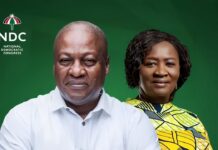
Kumasi, GHANA– The U.S. Ambassador to Ghana, Stephanie S. Sullivan, visited the Ashanti Region from April 21-25, 2021. During her trip, she reaffirmed the U.S. government’s commitment to address climate change, participated in a tree-planting initiative as part of the Asante Kingdom Landscape Restoration Project, and inaugurated a U.S. government-sponsored solar panel energy system at a local health facility. She also met with the Honorable Ashanti Regional Minister Simon Osei-Mensah and paid a courtesy call on the Asantehene, Otumfuo Osei Tutu II. Ambassador Sullivan visited Kwame Nkrumah University of Science and Technology (KNUST) Vice-Chancellor Rita Akosua Dickson and met with U.S. government health and education program partners and U.S. government exchange program alumni.
To commemorate Earth Day, Ambassador Sullivan joined Amakomhene Nana Adu Mensah Asare for a tree-planting ceremony in Ankaase at Lake Bosomtwe on Thursday, April 22. This ceremony was a part of the global One Trillion Trees Initiative as well as the Asante Kingdom Landscape Restoration Project, a program launched by the Asantehene, Otumfuo Osei Tutu II, in 2019 with the aim to plant 2.5 million trees around Lake Bosomtwe. Also in attendance were members of the Asantehene’s Council of Chiefs. Following the tree-planting ceremony, Ambassador Sullivan paid a courtesy call on the Asantehene and discussed the Asantehene’s conservation plans as well as other areas of collaboration.

On Friday, April 23, Ambassador Sullivan joined the Sekyere Afram Plains District- Community-based Health planning and services (CHPS) Director and the Honorable Member of Parliament for Sekyere Afram Plains District Alex Adomako Mensah, the Dawia Chief Nana Ibrahim Mahama, the PEG Solar Ghana, and local leaders to commission a recently installed solar power system at the Dawia CHPS compound. The system was made possible through a U.S. Agency for International Development (USAID) and Power Africa off-grid grant. Through this U.S. government funding, PEG Solar Ghana is installing 55 standalone solar energy systems at previously unelectrified and under-electrified healthcare facilities in the Ashanti Region. By ensuring a reliable supply of energy to clinics, hospitals, COVID-19 testing centers, isolation quarters, and cold storage services, Power Africa’s critical work is helping Ghana achieve universal healthcare. During the commissioning, Ambassador Sullivan applauded the Government of Ghana’s partnership with PEG Solar Ghana to make quality healthcare available to everyone, saying, “In communities like these, stable energy can be a literal lifeline, allowing mothers to receive 24/7 high-quality healthcare services and preserving the integrity of the cold chain for vaccine storage.”

During her five-day trip, Ambassador Sullivan also paid a courtesy call on the Honorable Ashanti Regional Minister Simon Osei-Mensah, where the two discussed mutual interests and U.S. assistance in the region and explored areas for further collaboration.
At KNUST, Ambassador Sullivan met with Vice-Chancellor Rita Akosua Dickson and her leadership team as well as the recent grantee of the USAID Partnerships for Enhanced Engagement in Research (PEER) program, Professor Veronica Dzomeku. Professor Dzomeku received U.S. government funding to develop her WhatsApp-based referral and triage obstetrics system to help community healthcare workers reduce health care service delays in Ghana. Ambassador Sullivan also received an update on two projects funded through the U.S. Department of State’s University Partnership Initiative (UPI) between KNUST and two U.S. institutions – the Texas International Education Consortium and Iowa State University. These projects aim, respectively, to accelerate the quality of education for Ghanaian students through an assessment of capacity, faculty development, and production of online course content at KNUST and to strengthen KNUST engineering faculty and students’ capacity to undertake participatory community development projects. She also participated in a graduation ceremony of U.S. Embassy grantee Kids Makers Project, a Kumasi Hive initiative that introduces children between the ages of 8 and 16 to STEM subjects, skills, and careers.
###
About USAID
USAID is the lead U.S. government agency that works to end extreme global poverty and enable resilient, democratic societies to realize their potential. USAID’s activities and strategic partnerships support Ghana’s journey to self-reliance and advances an integrated approach to development. It promotes accountability, sustainable systems, and inclusive development.
About Power Africa
Power Africa is a U.S. Government-led partnership that harnesses the collective resources of over 170 public and private sector partners to double access to electricity in sub-Saharan Africa, add at least 30,000 megawatts (MW) of new electricity generation capacity, and 60 million connections by 2030. Since 2013, Power Africa has helped bring over 4,000 MW of cleaner and more reliable power generation and first-time electricity to over 88 million people across sub-Saharan Africa. This newly generated power is now electrifying health facilities and energizing national- and sector-level strategies to rebuild more effectively and stronger than before.
About the PEER Program
In January 2021, USAID announced more than $5.8 million to fund partnerships in scientific cooperation on research projects to discover, test, and scale breakthrough solutions for critical challenges in international development through the Partnerships for Enhanced Engagement in Research (PEER). A collaboration with the U.S. National Academies of Sciences, Engineering, and Medicine, PEER is a competitive grants program that supports talented researchers and practitioners put in practice their research proposals and contribute to scientific advances in Ghana and across the globe. Awards range in amounts from $54,000 to $300,000.


























